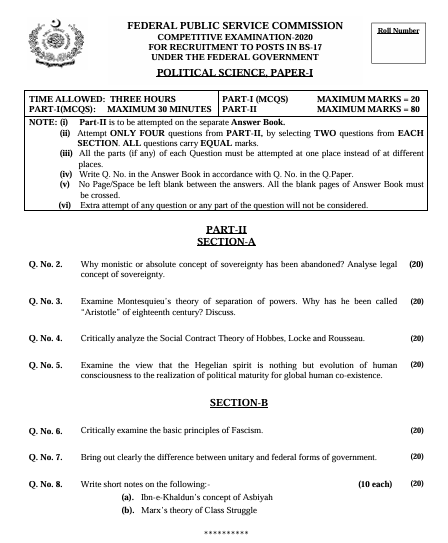Table of Contents
ToggleCSS Political Science 2020 Paper-I
SECTION-I
Q. No. 2. Why the monastic or absolute concept of sovereignty has been abandoned? Analyze the legal concept of sovereignty.
Q. No. 3. Examine Montesquieu’s theory of separation of powers. Why has he been called “Aristotle” of the eighteenth century? Discuss.
Q. No. 4. Critically analyze the Social Contract Theory of Hobbes, Locke, and Rousseau.
Q. No. 5. Examine the view that the Hegelian spirit is nothing but the evolution of human consciousness to the realization of political maturity for global human co-existence.
SECTION-B
Q. No. 6. Critically examine the basic principles of Fascism.
Q. No. 7. Bring out clearly the difference between unitary and federal forms of government.
Q. No. 8. Write short notes on the following: (10 Marks each)
- Ibn-e-Khaldun’s concept of Asbiyah
- Marx’s Theory of Class Struggle
Summary:
Section I
Q. No. 2. Why the monastic or absolute concept of sovereignty has been abandoned? Analyze the legal concept of sovereignty.
This question asks for an analysis of why the absolute or monastic concept of sovereignty, where the monarch held supreme, unchallenged power, has been abandoned. It should explore the shift towards the legal concept of sovereignty, where sovereignty is vested in law and the state is bound by constitutional frameworks, emphasizing modern democratic principles.
Q. No. 3. Examine Montesquieu’s theory of separation of powers. Why has he been called “Aristotle” of the eighteenth century? Discuss.
This question requires an examination of Montesquieu’s theory that divides government into three branches—executive, legislative, and judicial—to prevent any one branch from gaining too much power. It also asks why Montesquieu is considered the “Aristotle” of the 18th century, a reference to his significant contributions to political philosophy, particularly regarding the separation of powers.
Q. No. 4. Critically analyze the Social Contract Theory of Hobbes, Locke, and Rousseau.
This question asks for a critical analysis of the social contract theories of Hobbes, Locke, and Rousseau, each of whom had a different view on the nature of human beings and the legitimacy of government. The discussion should cover Hobbes’ view of a strong central authority, Locke’s ideas about natural rights and limited government, and Rousseau’s notion of the general will.
Q. No. 5. Examine the view that the Hegelian spirit is nothing but the evolution of human consciousness to the realization of political maturity for global human co-existence.
This question asks for an examination of Hegel’s concept of the “spirit,” which refers to the unfolding of human consciousness and reason in history, leading to political maturity and global coexistence. The discussion should analyze how Hegel viewed history as a process of realization of political freedom and ethical life.
Section B
Q. No. 6. Critically examine the basic principles of Fascism.
This question requires a critical examination of fascism, focusing on its key principles, such as authoritarian leadership, nationalism, the rejection of democracy, militarism, and the control of society by the state. The analysis should explore how these principles manifest in fascist regimes.
Q. No. 7. Bring out clearly the difference between unitary and federal forms of government.
This question asks for a comparison of unitary and federal forms of government, highlighting their key differences. In a unitary system, power is centralized in a single national government, whereas in a federal system, power is divided between central and regional governments. The discussion should explore the advantages and challenges of both systems.
Short Notes:
Ibn-e-Khaldun’s Concept of Asbiyah:
This question requires a brief explanation of Ibn-e-Khaldun’s idea of Asbiyah, which refers to social cohesion and solidarity within a group or tribe. It plays a crucial role in the rise and fall of civilizations according to his theory of social dynamics and history.
Marx’s Theory of Class Struggle:
This question asks for an explanation of Marx’s theory of class struggle, which argues that history is driven by the conflict between different social classes, primarily between the bourgeoisie (capitalists) and the proletariat (working class), leading to revolutionary change and the establishment of a classless society.
